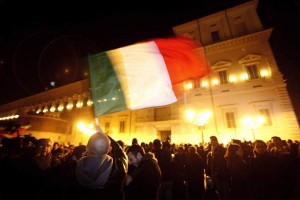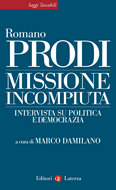Prodi: I think the change with Monti will bring Italy in safe waters
 Economist named Italy’s new prime minister
Economist named Italy’s new prime minister
Mario Monti, a former European Union commissioner, is expected to name nonpoliticians to his Cabinet. Next, he must try to steer Italy out of the debt crisis with austerity measures sought by the EU.
By Don Lee on Los Angeles Times , November 14, 2011
Reporting from Rome—
Eager to win back the confidence of financial markets, Italy’s president on Sunday appointed economist Mario Monti to lead the country’s new government. The move came almost 24 hours after Prime Minister Silvio Berlusconi submitted his resignation amid widespread celebration on the streets of Rome.
President Giorgio Napolitano’s announcement sets the stage for Monti, a former European Union commissioner, to form a new technocratic government that will try to navigate Italy out of the debt crisis with austerity measures sought by the European Union. The EU is demanding Italy cut public spending, reform its pension and take other steps to reduce the nation’s $2.6-trillion public debt and spur growth in the world’s eighth-largest economy.
Italy has been at the center of the Eurozone’s debt storm in recent weeks, along with Greece, as investors grew increasingly anxious about Berlusconi’s leadership and the fractured Parliament’s capacity to come together on a package of economic reforms.
Berlusconi, 75, faced intense pressure to step down after Italy’s cost of borrowing jumped sharply. With another round of bond auctions coming up this week, Napolitano and other Italian leaders were keen to announce a new government leadership before markets opened Monday morning.
“The key is the conviction markets have in a Monti administration and its ability to enact reforms,” said Paul Donovan, a global economist at UBS Investment Bank in London. He said it’s likely investors will react positively but cautioned that it hardly means the EU’s debt crisis is over.
“I think the attention may shift elsewhere,” he said. “France is a key focus for investors.”
The appointment of Monti, which was expected, came after consultations with various parties and factions, suggesting that he had enough backing from lawmakers to govern. Monti is expected to name a team of nonpoliticians to his Cabinet, and on Monday is likely to receive a vote of confidence from a majority in Parliament.
Some members of Berlusconi’s center-right party, however, argued for an early election rather than allowing the government of technocrats to continue into 2013. Other critics argued that a Monti administration would have trouble succeeding because it lacked electoral legitimacy.
Monti, however, has received tacit if not direct backing from EU and international leaders, including Christine Lagarde, the head of the International Monetary Fund, which will soon begin tightly monitoring Italy’s progress in making reforms.
“I think the change with Monti will bring Italy in safe waters,” said Romano Prodi, a former Italian prime minister who also served as president of the European Commission. As a member of the commission, Monti led the antitrust fight against Microsoft.
Prodi described Monti as a serious economist who is well versed with not just abstract economics but also the real world of quantities. “When he takes a decision, he has this matrix in his head,” Prodi said in a telephone interview Sunday from his home in Bologna. “He ponders the pros and cons…. He has calm blood.”
In that way, the staid and professorial Monti couldn’t present a more striking contrast to Berlusconi, a flamboyant billionaire whose domineering style, charges of corruption and proclivity for making sexist quips and gaffes hurt Italy’s standing among financial markets and EU leaders.
In appointing Monti, Napolitano praised him as someone with an “independent personality” and “international respect.” The president also reminded reporters that from now to the end of April, auctions were planned for the sale of about $273 billion worth of state bonds and that a high rate of interest could put a strain on the government.
Monti said in a statement that his government would work to “restore the financial situation and promote growth with a focus on social fairness.” That immediately fueled speculation that one of his first acts would be to introduce a tax on real estate and other assets.
He didn’t stop to answer reporters’ questions as he was leaving the presidential palace Sunday night, saying, “Since I have to work quickly and well, I’ll say bye-bye to you.”
Berlusconi was ensconced in his central Rome home for most of the day. When supporters gathered outside in the afternoon, he came out and acknowledged them.
Later in the evening, he released a 10-minute video message to the nation, saying that he was saddened that his “gesture of generosity and responsibility” in resigning was met with “whistles and insults.” He said he would support the Monti-led government and insisted that his political life was not over.
“I will not surrender,” he said.
don.lee@latimes.com
Special correspondent Livia Borghese contributed to this report.






















